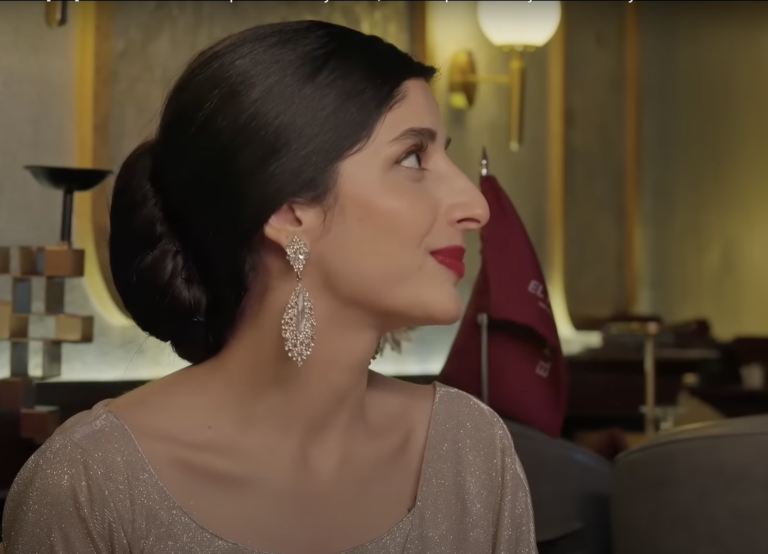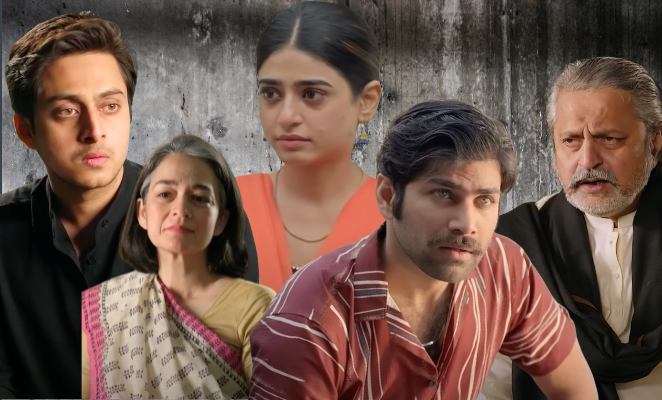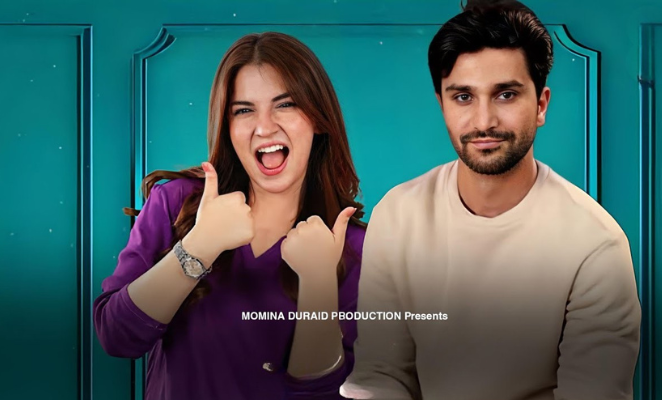I’ve been reviewing Bilqees Kaur since it first began, way back when, and, after having watched the finale, I’m kinda going back and forth in my mind about how to go about writing this review. Hmmm….hmmm… Here, you know what, I’ll just go ahead and share my dilemma with you all. Perhaps you guys can help out. So, tell me, will I sound like a like a broken record if I barsao tareef ke dongre on Bilqees Kaur one more time? Will it seem excessive if I praise Faiza Iftikhar for her brilliant script yet again? Will I come across as a groupie if I again applaud Adnan Ahmed for his excellent direction? Will I sound like a phata dhol if I laud the star cast for their brilliant portrayals of their very complex and nuanced roles? Will I be considered a panderer if I commend Momina Duraid and MD Productions for giving us yet another memorable serial? Will I? What to do? How to do? Questions upon questions, and then more questions …..
You know though, after ruminating on these dilemmas for a bit, I have come to conclude that ultimately I don’t really care what anybody says or thinks. For me, at least, this was a masterpiece of a serial: skillfully and thoughtfully written, sensitively directed, and brilliantly acted, an almost perfect blend of drama, melodrama, humor and romance – so why hold back on applauding? After all we are quick to critique and point out flaws, so why not be equally generous with the praise? Mind you, I’m not saying Bilqees Kaur was flawless, I had several issues with it at various points in time, but overall these did not inhibit my thorough enjoyment of the unfolding of this very unpredictable saga.
We are inundated with serials 24/7, day in day out, most of whose names I don’t even care to remember, because they are all so forgettable and mostly sound the same; add to this the fact that a vast majority of the plots are so blandly formulaic, with dialogues so routine that any ten year old could recite those in his/her sleep, and don’t even get me going on the beyond clichéd mazloom aurat theme – shudder!! If among all these totally undistinguished and mindlessly mass-produced serials, there actually are a couple that dare to be different, that are aimed at a section of the audience that still remembers how to think, enjoys the challenge of a complex storyline, and appreciates the fact that the producers do not take their viewers as empty headed and shallow, then I see it is as an obligation to highlight that extra effort, which is not merely aimed at gaining the highest TRPs, but also involves a bit of heart in it. So, yes, a huge thank you to MD Productions and the entire Bilqees Kaur team – take a bow! You guys totally deserve the bouquets and the applause!!
And, no, I haven’t forgotten… here’s the review!
Throughout the course of these nineteen weeks, my feelings towards Bilqees have swung like a pendulum, from one extreme to the other. I have empathized with her and hated her in almost equal measures, but no matter how I felt, I did maintain that the key to understanding her behavior lay in the shadows of her murky past. In my review of Ep 11, I wrote: “All her hard work [is] being reduced to a naught as she [is allowing] the shadows of her less than illustrious past cloud her present reality… her tough exterior and sharp tongue, perhaps once a way of keeping intrusive questions at bay [is] now so much a part of her persona that even her own family [is] resentful and [has] turned against her.” Along similar lines, after Ep13, I had noted: “… We got yet another glimpse into Bilqees’ difficult relationship with her past. Ill-tempered and stern as she might seem today, in some ways she is still trying to gain approval and acceptance. The very difficult time she had after her conversion still haunts her. Hence her push to get her children married into Iqbal’s family, her visceral reaction to Anjuman’s elopement, and her concern with duniya kya kahegi. One sees her getting worked up every time she hears her children being referred to as Sikhni ki aulad. Even Iqbal, innocuous as he seems, has never hesitated to remind her of her elopement. One can only wonder as to what role all those experiences have played in her becoming the stern and dominating person she is today.”
Despite my understanding of how the past continued to impact her present, I have to say today’s revelations, about the extent of pain Bilqees had gone through, took me completely by surprise. I, for one, totally did not see this turn coming. Wow!! Faiza, you just blew me away!!! I will not reveal the story here (those who’ve seen it know it, and those who’ve not, will not appreciate the spoilers), but suffice it to say, it was a brilliant twist. Once the context was established, Bilqees’ behavior made sense, and provided so much insight into why Billo had turned into the curmudgeon she had become. After watching Ep 14, I had applauded Faiza’s storytelling technique: “I love that Faiza Iftikhar’s story is not linear. The serial did not begin with Bilqees eloping, rather, with every episode we get a little bit more of a sense of Bilqees’ past and what role it has played in shaping her into the person she is today.” Thank you Faiza, for giving us such a human protagonist; we loved her and hated her, we laughed with her and at her, and today, even cried with her. Bilqees Kaur was a very complex and textured character, with so many shades and layers to it, but the way it was brought to life so beautifully and skillfully by Bushra Ansari, is a testimonial to this actress’ unquestionable talent; she is truly worthy of being called a living legend.
This was wonderful finale. Almost all the loose ends were tied up neatly; we saw Hassan one last time (excellent performance in a small role by Fawad Jalal), Sobia finally got her act together to make the phone call to Soha. Here, I am really glad we were shown a more of an opening of a channel of conversation, which was so much more realistic than the happy resolutions usually depicted in our serials. Mumtaz, finally got to speak her piece, and we heard so many of her very rightful complaints. Early marriages, no matter what the parents’ reasoning might be, are just wrong, and this was beautifully illustrated here. What didn’t make sense to me at all though was Mumtaz’ absence in the hospital. Where did she go? Nobody even seemed to care? Surely after such a huge shocker, there should’ve been a concerted effort by the brothers to keep the siblings together. And speaking of missing siblings, where has Anjuman been? Did she go to India? Or was she MIA because the bechari bacchi was mad at the producers for cutting short her role and editing out her long awaited wedding? If I were in her place, I know I would be!!
And how cute were Sultan and Soha today. To begin with, I was not a Sultan fan, but he definitely got my attention with the penultimate episode. After the finale, he remained an idiot in many ways, but redeemed himself in other places. It took a phone call from Hassan to vacuum the cobwebs of doubt from his mind. Soha too finally stepped out of her ego to finally clear up her misgivings about Liz the lizard, a lovely cameo by Maha Warsi. Ahsan Khan and Syra Yousuf totally rocked as the young newly wed couple, trying to come to terms with their brand new relationship. I know that it’s a good thing we don’t see much of Syra onscreen, helps keeps her appeal fresh, but still, I would like to see her act in at least one serial a year. Conversely, while there is no doubting Ahsan Khan’s talent and screen presence, he really needs to reassess his role selection and cut down heavily on the number serials. No matter how good an actor anyone is, I, for one, certainly do not want to see him/her romancing someone different every day, in some cases twice a day, and wearing the same clothes – ugh!! All this overexposure induces what I call viewer fatigue. I don’t know about others, but after a self-declared moratorium on Sanam Baloch, I’m taking a break from Ahsan Khan’s serials as well.
Inayat and Peeno, we did not see much of them today, but throughout, I have immensely enjoyed Sadia Imam and Kashif Mehmood’s excellent comeback. What an outing this has been for both of them. They had relatively smaller roles, but they brought so much life to them. Sadia was particularly outstanding. I just loved watching her Peeno-pan and her childish giggles, her stammering, and her absolutely adorable way of addressing her husband as Inayat-ji. I don’t know for how many days Kashif Mehmood went without showering and shaving, but he was so immensely believable as the uncouth, foul-mouthed, Deedar-ji-ka-aashiq taxi driver. Loved this couple!
Bala… we’ve never talked much about him, but wah ji wah! Yeh sahab to sarey dramey ki asal wajah nikle! Talk about a chupa rustam! And here we were all sympathizing with him for being such a mazloom shohar! Beautifully underplayed by Khalid Ahmed! Not once did we ever get a hint of his colorful past. Kudos to Faiza, Adnan, and Khalid for keeping this trump card hidden up their sleeve till the very last minute. Adnan, I seriously think your talent is being under-utilized in these social/romantic/gharelu serials. Please direct a thriller – can’t wait to see you in action in that genre!
Lastly, Adnan Ahmed, you kept raising the bar with every episode, and the graph continued to rise till it reached a crescendo with the superb finale. After Mera Naseeb, this was certainly a praiseworthy second outing from you. We had a lot of expectations from you and you certainly showed us that Mera Naseeb was not a flash in the pan; looking forward to bigger and better projects from you. I sincerely do hope our producers will take note and utilize your talent to bring us something different.
Before I end, an important issue I wanted to highlight was the excessive smoking, unnecessary scenes of physical abuse and uncalled for bad language shown in this serial. I understand that these elements contributed to the story, but surely, there are other ways of showing these as well. In the West, or even in India now, smoking is banned on screen, but the directors there do find creative ways of showing stress. Similarly physical abuse can be hinted at by showing bruises, rather than actually showing the act. Foul language too needs to be curtailed. I do not want my children to grow up thinking behaya, beghairat, kamini are okay to use in everyday life. Given that so many of our younger lot of directors and actors are trained abroad and fully conversant with all these issues, I was surprised to see Inayat smoking in front of his pregnant wife, or chain smoking in that closet of a bedroom day after day; surely all that was not crucial to the story.
So, there you have it, my review of the Bilqees Kaur finale; looking forward to all the comments. A huge thank you once again to all the readers and commentators of not only this thread, but my other reviews as well. This is my final review for DramaPakistani and I really appreciate all of you for taking to read, comment, appreciate, and critique my writings. I hope you’ve enjoyed reading my thoughts as much as I’ve enjoyed reading yours. Adios amigos!!




 THE QUEEN OF MY DREAMS
THE QUEEN OF MY DREAMS  A heartfelt story
A heartfelt story 


 This summer, let your child explore,
This summer, let your child explore, 






 Saim
Saim 


